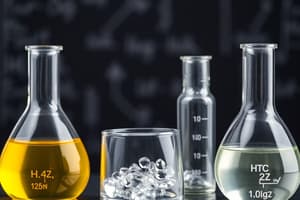Podcast
Questions and Answers
What defines matter in a scientific context?
What defines matter in a scientific context?
- Anything that has both mass and volume (correct)
- Anything that has mass and energy
- Anything that has volume and shape
- Anything that can be measured or weighed
Which of the following statements is true regarding the phases of matter?
Which of the following statements is true regarding the phases of matter?
- A liquid has a fixed volume but a varying shape. (correct)
- A gas maintains a definite shape and volume.
- A solid has a variable shape and volume.
- A liquid has no upper surface.
What distinguishes physical properties from chemical properties?
What distinguishes physical properties from chemical properties?
- Physical properties can change matter into another substance.
- Physical properties can only be observed at high temperatures.
- Chemical properties include characteristics such as color and density.
- Chemical properties require interaction with other substances to be observed. (correct)
What best describes a change of state in matter?
What best describes a change of state in matter?
How is total energy of an object defined in the context of chemistry?
How is total energy of an object defined in the context of chemistry?
Which of the following best describes the relationship between energy states?
Which of the following best describes the relationship between energy states?
Which of the following is NOT a physical property of a substance?
Which of the following is NOT a physical property of a substance?
What is the significance of significant figures in measurement?
What is the significance of significant figures in measurement?
What principle explains why energy is conserved during transformations?
What principle explains why energy is conserved during transformations?
In a gravitational system, what happens to the potential energy when a weight is lifted and then falls?
In a gravitational system, what happens to the potential energy when a weight is lifted and then falls?
How does a stretched spring convert energy when released?
How does a stretched spring convert energy when released?
What takes place when oppositely charged particles are separated?
What takes place when oppositely charged particles are separated?
In the context of a car engine, what occurs as fuel burns?
In the context of a car engine, what occurs as fuel burns?
What is a hypothesis in the scientific method?
What is a hypothesis in the scientific method?
What does a scientific model do in relation to experiments?
What does a scientific model do in relation to experiments?
Which statement describes the scientific approach to understanding natural phenomena?
Which statement describes the scientific approach to understanding natural phenomena?
Flashcards are hidden until you start studying
Study Notes
Keys to the Study of Chemistry
- Chemistry explores matter, its properties, the transformations it undergoes, and associated energy changes.
- Matter is defined as anything possessing mass and volume, encompassing diverse entities like books, planets, and living organisms.
- Composition refers to the specific types and quantities of simpler substances that constitute a sample.
- Properties are distinct characteristics that define each substance's identity.
The States of Matter
- Solids maintain a fixed shape and volume; they can vary in hardness and flexibility.
- Liquids adopt the shape of their container while having a fixed volume and an upper surface.
- Gases lack a fixed shape and volume, resulting in no distinct surface.
Physical vs. Chemical Properties
- Physical properties are observable without interaction with other substances, e.g., color and boiling point.
- Chemical properties manifest during interactions and transformations, such as flammability and corrosiveness.
Changes of State
- Changes of state are classified as physical changes, where the composition remains unchanged and can be reversed by altering temperature.
- Chemical changes cannot be reversed merely by temperature adjustments.
Energy in Chemistry
- Energy is defined as the capacity to perform work; it exists in potential and kinetic forms.
- Potential energy is associated with an object's position, while kinetic energy relates to its motion.
- The relationship is expressed as Total Energy = Potential Energy + Kinetic Energy.
- Lower energy states are more stable than higher energy states; energy is conserved and can transition between forms.
Energy Conversion Examples
- Gravitational systems convert potential energy to kinetic when a weight falls.
- Stretched springs release potential energy as kinetic energy.
- Oppositely charged particles convert separated potential energy to kinetic energy upon re-attraction.
- In combustion, fuels convert chemical potential energy to the kinetic energy that powers vehicles.
The Scientific Approach
- Observations form the basis for natural phenomena and can lead to the formulation of natural laws when consistently observed.
- A hypothesis is a testable proposal that explains observations and may require revision based on experimental outcomes.
- Models (or theories) synthesize data from experiments, predicting related phenomena; they are refined or altered if predictions fail.
- Testing involves subsequent experiments to evaluate the accuracy of these predictions.
Studying That Suits You
Use AI to generate personalized quizzes and flashcards to suit your learning preferences.




